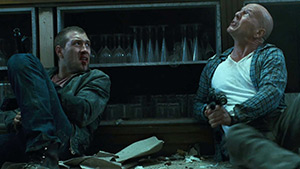C/O The California Department of Corrections
I know things have been tough since you were convicted of obstruction of justice. But I bring you glad tidings. There's one positive that you can take away from your incarceration: you won't be able to see A Good Day to Die Hard anytime soon.
It may be hard for audiences to remember, but before Die Hard was released in 1988, action movies were populated mostly by grim, monosyllabic heroes. More Superman than everyman. Die Hard proposed something new: that an action hero could rely on his wits just as much as his firepower; that a certain amount of vulnerability made a character more endearing. Bruce's Willis's John McClane was noteworthy for the fact that he spent much of the movie trying to get himself out of the dangerous situation he had unknowingly become mired in. He knew he was outclassed and outgunned; he just wanted someone to take his calls for help seriously. The best testament to Die Hard's revolutionary approach was how quickly it became shorthand for a new kind of action movie. The next decade saw every pitch described as "Die Hard on a [insert location and/or mode of transportation here]."
Of course you had expert help in crafting the original film, John. Your direction was top-notch, but so was Jan de Bont's crisp, shimmering cinematography. And the script by Seven E. de Souza was far more concerned with McClane's relationship with his wife than his service revolver. So, if this group represents the A-team of action cinema, I guess that would make the filmmakers of A Good Day to Die Hard the Ω-team.
That's right, I can't even place them in the same alphabet as you.
Maybe I need to be more methodical in my analysis. Let's approach this the same way Alan Rickman's Hans Gruber might when assembling his crack team:
Skip Woods, screenwriter. Perhaps I should start off by admitting that after I watched A Good Day to Die Hard, I did a Google search to find out if "Skip Woods" is the screenwriting equivalent of "Alan Smithee". But it's not, which means that Woods intentionally chose to take all the elements that make a Die Hard film fun and unique - the single location, the interplay between McClane and his antagonist - and tosses them out completely. Instead, we see McClane travel from New York to Moscow to help his supposedly bad-seed son (Jai Courtenay, embodying the phrase "zero charisma"), who in reality is a CIA agent deep undercover. McClane Jr. is protecting a powerful Russian somebody from some other powerful Russian who wants to … well, none of that is clear. Not even, I suspect, to Skip Woods.
Jonathan Sela, cinematographer. I feel bad for what you must have put Jan de Bont through, John. All those miles of track he had to lay to get those precise camera movements. Apparently all he needed to do was shake the camera around like it was trying to shake loose a piece of gum from his finger. Unless, of course, you wanted the audience to be able to tell what was happening onscreen. Which is something that apparently doesn't concern Sela.
John Moore, director. Here was have the criminal mastermind behind this enterprise. You may have missed this during you stay at Club Fed, John, but apparently the knowledge of how to piece together an actual coherent film is no longer a pre-requisite for employment in Hollywood. Moore is incapable of creating even the most basic onscreen geography to tell the audience where people are in relation to each other. Even in dialogue scenes, which use basic cinematic techniques perfected over that last eighty years, it's impossible to tell who is talking to who, even when characters are supposedly in the same room. As you might be able to imagine, things don't get any better when the film shifts into bombastic action. I can all-too-clearly picture Moore giving commands to editor Dan Zimmerman, who, acting as Theo to Moore's Gruber, would delightfully exclaim with each cut, "And the spatial continuity IS toast!"
With this group of men, we have a team of criminals that has finally pulled off what was never before possible: they have taken down John McLane.
But, as I said earlier, I write to cheer you up. Like all good Die Hard characters, I have a plan to reap some good from this disaster. You see, all we have to do is play a copy of A Good Day to Die Hard at your next parole hearing. After watching it, I don't think any judge would deny you your freedom. You see, he'll realize that by keeping you locked away, unavailable to provide any stewardship for this franchise, you're not the one being punished. It's all of us.
Sincerely,

Casey







